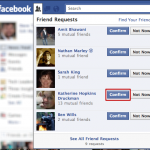 For as long as there have been social networks, there has been a debate over having a smaller number of higher quality connections versus a higher number of supposedly lower quality contacts. On Facebook, the evidence seems to be firmly falling into the latter camp. Pew data from earlier this year suggested that the average number of friends people had on Facebook was over 300, whilst those in the 18-24 age group averaged a whopping 510 friends.
For as long as there have been social networks, there has been a debate over having a smaller number of higher quality connections versus a higher number of supposedly lower quality contacts. On Facebook, the evidence seems to be firmly falling into the latter camp. Pew data from earlier this year suggested that the average number of friends people had on Facebook was over 300, whilst those in the 18-24 age group averaged a whopping 510 friends.
Concepts such as the Dunbar number would suggest that few of those ‘friends’ can be in any way meaningful relationships, right? Well, maybe, but maybe not.
A study, published recently, has explored the relative depths of our social relationships, and in particularly the effect friending someone online has on that relationship.
The study explored our perceptions of people, and how social networking influences those perception. They were especially keen to see whether the information we share online flavours that perception, and also whether adding someone to our friends list does too.
The researchers recruited nearly 250 students to test out a mythical Facebook application that they were told would help them to form study groups. Half of the participants had to log-in to Facebook and accept at friend request from a fellow classmate called Jordan, who was in fact a fictional person created by the researchers, who alternated between a male and female to remove gender bias from the study.
These participants were then asked their opinion of Jordan, including how well they thought he/she would get along with the student and their circle of friends. It transpired that the students that had added Jordan as a friend were much more likely to be positively disposed towards him than those who had not, even though none of them had ever actually met him/her.
Obviously the finding is fascinating because adding someone online does little to inform us of that persons traits as an individual, yet nevertheless appears to be a quick and easy way of starting a relationship. Suffice to say, the study was limited to Facebook, so it isn’t clear whether a similar finding might emerge on professional networks such as LinkedIn, or even on internal social networks.
The research suggests it may well do however, as we have a natural tendency towards cognitive consistency. In other words, we adjust our thinking to align with our behaviours. So, if you’ve just added someone as a ‘friend’ online, then it makes sense that you will then think of them as more of a friend.
Funny old world isn't it? Something so seemingly insignificant can actually have a big impact. I do wonder how long that feeling lasts though?
Interesting findings, to say the least. I think we are in a new world, where Facebook and other social networks are part of the fabric in our interpersonal communications and relationships. Some folks deny this new reality, refuse to connect on Facebook, and that's fine. But I'd say it tells just as much as those who, like in this study, will be more friendly towards someone they haven't met yet, but have "friended" on Facebook, for example. It's just a different way to interact nowadays, and we need to adapt, I say… 🙂
Cheers,
Thanks Frederic. It would be fascinating to see if a similar thing can be observed on other social networks. There are clear benefits on LinkedIn for instance. Could there even be something similar happening on Twitter, despite the less personal nature?
I wonder if a similar principle applies for organisations too?